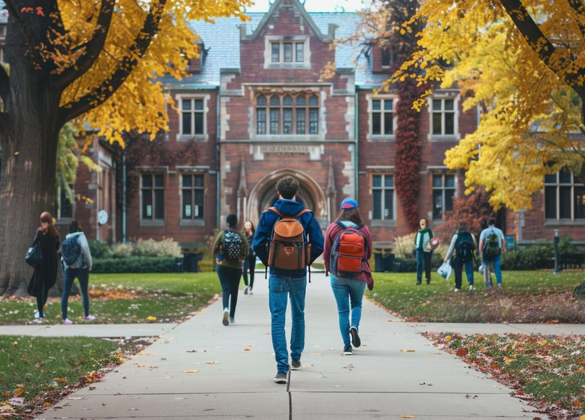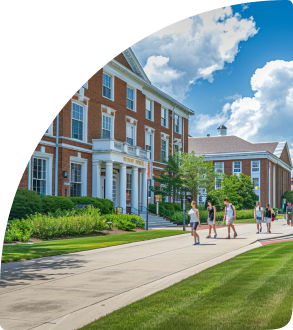Boost School and University Enrollments & Visibility with Local SEO
Every day, parents search online for schools near them. Students explore universities that match their programs of interest. Faculty members look for nearby institutions to join. A Niche study discovered that 60% of parents said school websites impacted their enrollment decisions in schools. If your school or university does not show up in those local searches, you are missing out on real opportunities.
That is where Local SEO for education can help you. Our Schools & Universities Local SEO Services help your institution appear in Google Maps, local search results, and "near me" searches. The goal is simple: help more people in your community find you at the exact moment they are searching for an education provider like yours.
If you think about it, parents often make school decisions the same way they decide where to eat dinner: they Google it. The difference is that schools carry much higher stakes, so being visible in those searches matters even more.
What is Local SEO for Schools & Universities?
Local SEO for schools and universities study:
is the process of improving your educational brand's online presence so your institution shows up in local searches when people search for "best schools in Denver", "best schools for higher education near me", etc. These searches may sound simple, but they reflect big decisions. A parent's first click can determine where their child spends the next five or ten years.For example:
- A parent in Miami types "best elementary school near me."
- A high school graduate in Atlanta searches "affordable MBA programs near me."
- A faculty member in Dallas looks up "universities hiring adjunct professors."
If your school or university appears in these searches, you get more inquiries, more applications, and more trust from your community.
Local education SEO is different from traditional SEO because it focuses on local intent for educational institutions. Instead of competing with every institution nationwide, you are making sure your school or university stands out where it matters most: in your city, your neighborhood, and your community.
Why Local SEO Matters for Schools & Universities
Education decisions often begin with a search engine. Parents want to know which schools near them have the best ratings. Students compare programs at local universities. Even faculty members research nearby opportunities before applying. If your institution does not appear in those searches, you may lose visibility at the most important stage of decision-making.
Local SEO helps schools and universities build trust and attract attention in the local community. When people see your institution listed at the top of Google Maps or in the local search pack, they are more likely to click, call, or schedule a visit.
According to a recent Niche K-12 Parent Survey study:
- 64% of parents considered 3 or more schools during their school research process.
- 27% of parents start their school search process with Google Search.
- 23% of K-12 families considered review platforms during the school discovery and selection process.
- 17% of families said they changed schools because other local schools earned higher rankings
Think about it. When was the last time a parent pulled out the Yellow Pages to look for a school? Today, the search almost always begins on Google, often on a phone, and often with 'near me.' If you are not showing up there, families may never know you exist.
One private school we worked with used to rely entirely on word of mouth. Families loved it, but online, it was invisible. Once it started showing up on Google Maps, inquiries doubled because more parents finally knew it existed.
Let’s help your school rise to the top of local search?
How Schools Can Implement Local SEO
Local SEO process starts by understanding how families and students in your area search online. It helps improve your presence so your institution appears when they need you most.
Some steps to optimize your school website for local SEO:
Google Business Profile Setup and Optimization
Google Business Profiles of schools are often the first result parents or students see these days. You must make sure it has the correct name, address, phone number, website, and hours. You can also add photos of your campus and share updates about events or admission deadlines.
Local keywords for School On-Page SEO
People search using phrases like "private high school in Boston" or "MBA program near Houston." By identifying these phrases, you can create content that matches what families and students are actually looking for.
Location-Specific Landing Pages
If you have more than one campus or program, create a page for each one. This helps search engines show the most relevant page to the right audience.
Review and School Reputation Management
Reviews carry weight with both search engines and people. Parents and students trust what others say about your institution. Asking for reviews and responding to them shows that you value feedback.
It's easy to assume parents trust school tours the most, but the truth is, many parents and students make up their minds before they visit. Reviews and ratings online often shape the decision weeks in advance.
Listing of Schools in Different Directories
Your school should appear in well-known directories such as Niche, GreatSchools, and other education portals. Keeping your information consistent across these sites strengthens both your credibility and your local rankings.
Local SEO Strategies for Universities and Educational Institutions
Schools and universities that want to stand out need education SEO strategies that highlight what makes them unique while also connecting with their community.
Google Business Profile Optimization for Schools
Think of your Google Business Profile as your campus entrance, but online. Many parents and students will see it before they even land on your website. If the profile looks empty, it can feel uninviting. On the other hand, if your GBP account feels alive when you add:
- Photos of classrooms
- Details about programs
- Updates on events and announcements
- Posting about open houses
- Admission deadlines
- Special events (if any)
We once saw a school's Google profile with just one blurry picture of its gate. Parents admitted it looked uninviting. After adding photos of classrooms and students at events, calls for tours increased almost immediately.
Local Keyword Research for Education Institutions
When families search for schools or universities, they rarely type broad terms like "college" or "school." Instead, they use specific phrases that include a location or a program. A parent in Boston might search "private high school in Boston." A student in Houston may type "MBA program near me." These are the searches that matter most for your institution.
Local keyword research helps you understand how people in your area are looking for education options. It is not just about ranking for the most popular terms. It is about finding the exact words your community uses and making sure your website speaks their language.
For example, if you run a STEM-focused high school in San Jose, targeting "STEM high school in San Jose" will bring in students who are specifically searching for that kind of program.
If you are a community college in Atlanta, showing up for "affordable community college near Atlanta" means you reach students who already know what they want.
When you focus on these intent-driven keywords, you can avoid competing with every institution nationwide. Instead, you connect directly with the people who are most likely to apply or visit your campus.
- Clear title tags
- Header tags
- Keywords that include your location
On-Page SEO for School Websites
If your website is hard to use, loads slowly, or does not answer key questions, visitors may leave the site before they even consider applying for admission.
On-page SEO for schools and universities helps you avoid problems. Search engines can understand what your pages are about and show them to the right people when you use:
For example, a page titled "Private Elementary School in Tampa" is more likely to appear when parents in Tampa search for schools for little kids in their area.
On-page optimization also helps create dedicated pages for specific education programs or campuses. A university that offers nursing, business, and computer science course can build a separate page for each.

Each program page on a university website should explain:
- The program details
- Highlight the faculty
- Show outcomes for students
- Career opportunities or further studies
This helps prospective students to find exactly what they are looking for.
A clear menu, fast load times, and mobile-friendly design are also factors that make it easier for parents and students to explore your site.
If families get answers quickly, they are more likely to book a tour or send an inquiry.
Content Marketing to Answer Parent and Student Questions
Parents and students often have questions before they choose a school or university. They want guidance, not just brochures. Content marketing gives you a way to answer those questions directly.
A blog post like "How to Choose the Right STEM School in Boston" or a simple FAQ about admission steps can be very helpful. Guides, checklists, or even short articles about programs make families feel more confident in their choices.
- Choosing the right school for your child: questions every parent should ask
- Why early exposure to STEM can spark long-term interest
- A parent's guide to making the most of a school tour
- Do extracurricular activities really help kids grow?
- Small class sizes: myth or real advantage for students?
- Public vs. private education: what families often overlook
- How schools can better support children with learning differences
- Why arts and sports programs matter more than you think
- Should you start at a community college before transferring?
- Questions worth asking on a campus tour (beyond tuition and housing)
- Double major, dual degree, or joint program: what's the difference?
- How internships and career services open doors for students
- Online classes vs. traditional classrooms: which fits better?
- Accreditation explained in plain language
- What really shapes student life outside the classroom
- How research opportunities influence career choices
📘 Blog Topic Ideas for Schools
🎓 Blog Topic Ideas for Universities

Parents rarely sit down and read brochures cover to cover anymore. Instead, they search very specific questions online, such as 'How much homework will my child have?' or 'What's the difference between AP and IB programs?' Content that answers these kinds of real questions builds trust much faster than generic marketing copy.
Reviews and Reputation Management for Schools
The Niche study also found that 70% of parents say they find it difficult to find reviews of schools, and negative reviews prevent them from choosing a school. When parents compare schools online, reviews are one of the first things they look at.
A school with recent, positive feedback feels trustworthy. A profile with no reviews or old, unanswered complaints does the opposite. Families may explore other school websites without even giving your website a chance.
That is why asking for reviews is so important. Parents who are happy with their child's experience, students who enjoy their classes, and even alumni can all share feedback that helps the next family feel confident. It does not take dozens of reviews overnight. Even a steady flow of honest comments makes a big difference.
Schools that collect reviews regularly and respond to them tend to show up higher in local results.
Building Local Backlinks and Citations in Education
Local backlinks and citations strengthen your school or university's authority online. A backlink is a link from another trusted website to yours.
When local organizations, news outlets, or education directories mention your institution, it tells Search engines get the signal that your site is credible if your school/university site or brand name is mentioned on:
- Local organizations
- News outlets
- Education directories
A citation is slightly different. It is any place on the internet where your school's name, address, and phone number appear together, even if there is no link to your website. Citations often appear on platforms like:
- Education portals
- Community boards
- Directories such as GreatSchools.org.
When your school details match everywhere, search engines and families trust that the information is accurate. That trust makes it easier for your school or university to rank higher in local search results.
Multi-Campus and Program-Specific SEO
Many schools and universities operate more than one campus, and some offer a range of programs. In both cases, a single general page is often not enough to attract the right audience.
For educational institutions with multiple campuses, each location should have its own page and its own Google Business Profile. This helps families and students in different areas find the campus that is closest to them. It also makes it easier for search engines to show the most relevant results.
For universities with different programs, program-specific pages are also important. A student looking for a nursing degree has different needs than someone searching for an MBA. By creating a page for each program, you can highlight details such as curriculum, faculty, and career outcomes.
When you treat each campus and program as unique online, you make your institution more visible and more helpful to the people who are searching.
Case Study: How a Private School in Denver Doubled Enrollment through Local SEO
The Challenge
This school in Denver had been around for years, and parents who enrolled their kids loved it. The problem was that hardly anyone outside that circle knew the school existed. If you searched Google for private schools in the area, the name didn't show up. Even families living close by were finding competitors instead and booking tours with them.
Our Approach
When the school came to us, we started with the basics. Their Google Business Profile wasn't complete, so we fixed the information, added new photos, and posted updates about admission dates and open houses. We also suggested a simple way for the staff to ask parents for reviews, which quickly gave the school a stronger presence on Google.
On the website, we built a few location-focused pages and gave more visibility to the arts program. Parents had always talked about how strong that program was, but it barely showed up on the site before. By putting it front and center, families could now see what made the school different.
The Results
After a few months, the changes started to show. The school began appearing in Maps results. One parent even told the school, 'I didn't know you were right around the corner until I saw you on Google Maps.' That single comment summed up the whole problem: visibility.
Campus tours nearly doubled compared to the previous term. Applications picked up so quickly that the school, for the first time, had to create a waitlist.
Local SEO Challenges That Schools and Universities Face
Local SEO sounds straightforward, but in practice schools and universities run into the same problems again and again. Some of them are small things that get overlooked, and others take time and effort to fix.
| Challenge | What it Looks Like in Real Life | Why it Becomes a Problem |
|---|---|---|
| Hard to find on Google Maps | Parents type "schools near me" and only see competitors. | Families never even know your school exists. |
| Programs not showing up | A student searches for "MBA program" and finds three other universities first. | Your best programs get hidden behind the competition. |
| Mixed-up listings | One site has the right phone number, another has the old one. | Search engines get confused, and so do parents. |
| No reviews (or very few) | A profile with zero reviews looks empty compared to others. | Parents hesitate to call because they do not see social proof. |
| Weak website setup | The site loads slowly, does not work well on phones, or has missing pages. | Visitors click away before they learn anything. |
| Not enough useful content | The site does not answer common questions about admissions, fees, or campus life. | Families leave with more questions than answers. |
These are not unusual problems. We see them across schools of every institution's size. The difference is whether they're fixed or left to push families toward competitors quietly.
Why Choose Media Search Group for Education Local SEO?
Local SEO for schools and universities is not the same as SEO for restaurants or retail stores. You are dealing with admission cycles, program-specific searches, and the expectations of both parents and students. It takes a different approach to do it well.
Our team at Media Search Group has been working in SEO for more than 13 years. Over that time, we have helped clients rank hundreds of thousands of keywords and bring in hundreds of thousands of visitors each month. More importantly, we have learned what works best for schools, from small private institutions to multi-campus universities.
We do not offer a one-size-fits-all plan. Each school or university has its own goals, its own audience, and its own challenges. That is why we build education SEO strategies around your programs, your location, and your community.
When you work with us, you can expect:
- SEO strategies built specifically for education institutions
- Monthly reports that show you what is happening, in plain language
- Content that speaks to parents, students, and even faculty
- Support for each campus or program you want to promote
At the end of the day, families don't just look for schools but also trust. Our role as schools & universities SEO experts is to make sure that your institution earns that trust online, before the first call or visit.
Get Started with Schools & Universities Local SEO Today
With our Local SEO agency for schools and universities, you can:
- Appear in Google Maps and local search results
- Build trust with reviews and accurate information
- Attract more inquiries, campus visits, and applications
- Stand out in your community and beyond
Media Search Group specializes in Local SEO for schools and universities. We create local SEO strategies that match the needs of education institutions, from single schools to multi-campus universities.
Frequently Asked Questions on Local SEO for Schools and Universities
Local SEO for schools is about making your institution easier to find online by the people who live nearby. When parents search Google for schools or when students check Maps for universities, local SEO helps your name appear in those results.
When your school shows up more often in search, more families and students discover you. That usually leads to more people visiting your website, calling for details, or booking a campus tour. Over time, those extra inquiries can turn into real applications and higher enrollment.
SEO is not instant. Most schools start noticing a lift within three to six months. The exact timeline depends on how competitive your area is, how visible you are now, and how consistently the strategies are applied.
It can. Local SEO combined with geo-targeted content can highlight things international students care about, such as housing, scholarships, or visa support. When someone searches for these details online, they have a better chance of finding your institution.
General SEO tries to reach anyone, anywhere. Local SEO narrows the focus to people who are close to your campus and ready to act. For a university, this could mean showing up for “MBA programs near me” instead of competing nationally for just the word “MBA.”
Yes, especially if campuses are in different areas. Each location should have its own Google Business Profile and a dedicated page on your website. That way, families searching in one part of the city find the right campus instead of landing on a general page.
Most parents just open Google Maps and type something simple like “schools near me.” They usually check the ratings first, skim through a few reviews, and look at photos. Many also click for directions or call straight from the listing before they even visit the website.
There isn’t one single thing, but a few basics go a long way. A fast site that works well on phones is important. Clear pages for each program or campus also help. Using the same words parents and students type into Google makes it easier for the site to show up.
Smaller schools usually only need to focus on one location, so the strategy is simpler. Big universities or schools with more than one campus often need a separate plan for each site, plus program pages to cover everything they offer. The bigger the institution, the more pieces you have to manage.
Parents often want straightforward information, things like admissions, fees, or how the school ranks. Students are more likely to look for program details, career options, or what campus life feels like. In the end, content that answers these real questions tends to get the most attention.
If parents searched for a school in your area right now, would they find you or your competitor?
Talk to our experts or request a local SEO audit of your school/university website.








